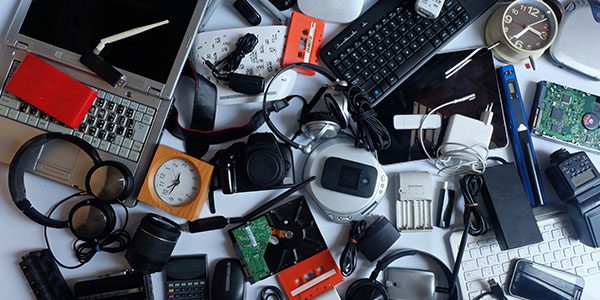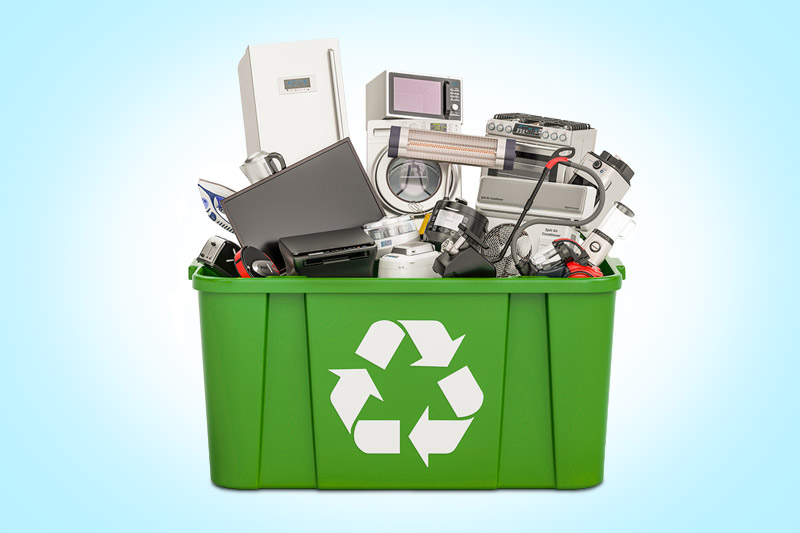Sustainable Electronics Disposal: Ensure Compliance with R2 Certification
Sustainable Electronics Disposal: Ensure Compliance with R2 Certification
Blog Article
Elevate Your E-Waste Management With R2 Certification: a Thorough Summary
One key technique to raise e-waste administration methods is by acquiring R2 accreditation. By exploring the benefits and procedures associated with R2 accreditation, a deeper understanding of just how it can transform e-waste management strategies emerges, shedding light on a path in the direction of sustainability and ethical disposal practices.
Value of E-Waste Administration

When e-waste is not managed appropriately, these poisonous materials can permeate right into the ecological community, creating injury to wildlife and possibly entering the food web, posing threats to human health. The inappropriate disposal of e-waste adds to pollution and greenhouse gas discharges, worsening environment adjustment and environmental deterioration.

Advantages of R2 Qualification

Firstly, R2 certification enhances trustworthiness by showcasing an organization's dedication to lasting techniques. It guarantees clients, partners, and stakeholders that the company sticks to strict criteria for e-waste administration - r2 certification. This integrity can result in increased count on and enhanced partnerships with customers that prioritize ecological duty
Second of all, R2 accreditation helps alleviate dangers related to inappropriate e-waste disposal. By complying with the stringent standards stated by the accreditation, companies can decrease the probability of data violations, environmental contamination, and lawful repercussions. This proactive strategy safeguards the firm's online reputation and decreases prospective obligations.
Lastly, R2 qualification shows a commitment to environmental stewardship - r2 certification. By properly managing electronic waste with licensed procedures, organizations contribute to the preservation of resources, reduction of pollution, and promotion of a circular economic climate. This dedication not just profits the setting however likewise lines up with evolving customer assumptions for sustainable company techniques
R2 Qualification Process Summary
Having developed the advantages of R2 accreditation in advertising trustworthiness, risk reduction, and ecological stewardship, it is important to now lay out the comprehensive procedure associated with acquiring this accreditation. The R2 qualification procedure starts with a detailed testimonial of the organization's operational plans and treatments to make sure compliance with the R2 criterion. This preliminary evaluation is vital in recognizing any gaps that need to be addressed prior to continuing better.
When the organization's methods align with the R2 common requirements, an independent third-party auditor conducts an on-site audit to review the implementation and performance of these techniques. This audit consists of a detailed review of documentation, meetings with staff, and physical inspections of facilities to confirm conformity.
Following a successful audit, the organization gets an accreditation choice based upon the auditor's findings. If accepted, the organization is provided R2 accreditation, showing its dedication to accountable e-waste monitoring. sites It is essential to note that keeping R2 accreditation needs ongoing compliance with the requirement's requirements and periodic audits to make certain ongoing adherence to finest practices in e-waste recycling and disposal.
Trick Standards for R2 Conformity
A necessary facet of accomplishing R2 compliance is guaranteeing that all digital waste (e-waste) processing centers satisfy stringent ecological and safety requirements. To abide with R2 demands, organizations need to stick to crucial requirements that focus on liable e-waste monitoring techniques. These criteria include applying a recorded ecological, health, and safety and security administration system, making sure the safe and resource secure handling of data-containing gadgets, and performing detailed downstream due persistance to track the final location of e-waste products.
Furthermore, R2 compliance demands the appropriate testing, repair, and recycling of electronic equipment to expand its beneficial life and minimize environmental impact. Facilities looking for R2 certification need to additionally prioritize worker health and wellness and safety and security by supplying essential training, individual safety tools, and a safe working atmosphere. In addition, maintaining detailed documents of e-waste handling activities and frequently undergoing audits by recognized certifying bodies are important components of showing recurring conformity with R2 requirements.
Influences of Sustainable E-Waste Practices
The implementation of lasting e-waste practices in conformity with R2 conformity not only makes sure environmental and security standards are met however additionally dramatically impacts the general lifecycle of digital products. By adhering to R2 standards, digital waste management processes become much more efficient, minimizing the environmental impact of electronic items. Sustainable e-waste techniques assist in the appropriate disposal of digital components, making certain that dangerous products are managed sensibly and do not wind up contaminating the atmosphere.
Additionally, lasting e-waste practices can add to task development in the recycling and repair fields, fostering financial development while advertising environmental responsibility. Generally, the fostering of lasting e-waste techniques under R2 accreditation serves as a vital step towards achieving an extra ecologically sustainable electronic devices market.
Conclusion
Finally, implementing proper e-waste administration techniques is essential for ecological sustainability and source conservation. R2 qualification plays a crucial function in ensuring liable handling and disposal of digital waste. By adhering to the stringent criteria stated by R2 criteria, organizations can not just decrease their environmental effect but additionally add to a more lasting future for generations to find.
One secret method to raise e-waste administration techniques is by achieving R2 certification. have a peek at this website By checking out the benefits and procedures connected with R2 certification, a deeper understanding of exactly how it can change e-waste administration strategies arises, dropping light on a path in the direction of sustainability and ethical disposal practices.
The R2 qualification process starts with a comprehensive review of the organization's operational plans and treatments to make certain compliance with the R2 standard. If authorized, the company is given R2 accreditation, demonstrating its dedication to liable e-waste monitoring. In general, the fostering of lasting e-waste practices under R2 certification offers as an essential step towards achieving a more environmentally sustainable electronic devices sector.
Report this page